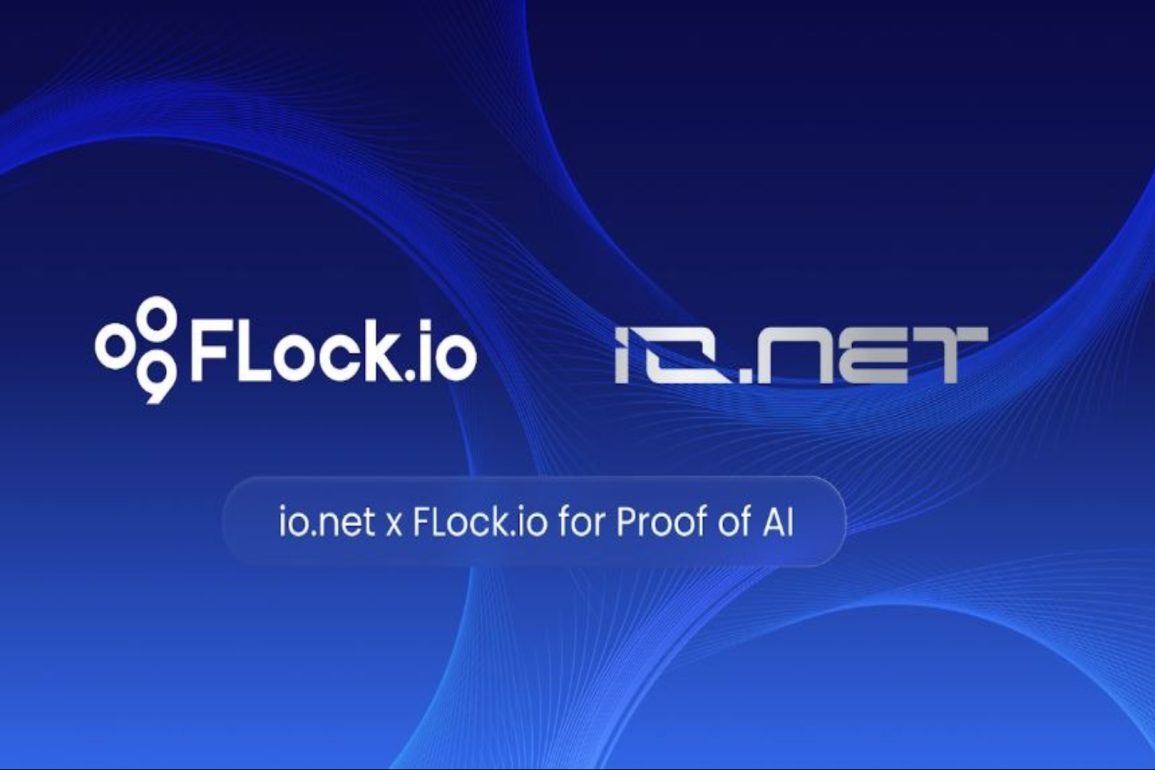- Summary:
- Over time, FLock plans to extend PoAI’s verification capability beyond compute to include AI training and federated learning.
FLock has partnered with io.net to develop the world’s first Proof of AI (PoAI) consensus mechanism for validating the integrity of nodes operating in a decentralized compute network.
With PoAI, decentralized physical infrastructure networks (DePINs) can verify the integrity of DePIN nodes through completing compute-intensive AI training tasks. PoAI is an AI-native Proof of Work, directing the resources of verification to meaningful AI tasks. It allows nodes to earn block rewards from DePIN as well as AI training networks, in this case both IO.net and FLock.io.
The mechanism, which substantiates the integrity of DePIN nodes in a decentralized and AI-native way, involves an engine that continuously provides challenges, aggregates responses, and supplies necessary stats (e.g., latency, score deviation, data correctness) to io.net nodes to compile judgments.

“AI engineers and end users alike need to trust the quality of the compute resources they are provided with, and Proof of AI is the key to achieving that,” said Jiahao Sun, Founder and CEO of FLock. “Compute underpins the entire AI development process, which is why we’re starting with that, and we are delighted to join forces with io.net, a true leader in its field.”
Decentralized AI ecosystem providers can leverage PoAI to verify honest actors on their networks and ensure truthful and high-quality compute AI training inputs. FLock is responsible for continuously providing challenges (generating synthetic data through inference on an LLM) that specify expected behaviour from GPU devices based on factors such as TFLOPS and VRAM.
The PoAI service will create a flywheel that connects FLock’s flagship decentralized training platform with decentralized AI DePIN platforms. Over time, FLock plans to extend PoAI’s verification capability beyond compute to include AI training and federated learning, with the possibility of a dedicated AI chain also under discussion.
“The arrival of Proof of AI will assuredly lead to tremendous improvements in AI model training and inference over decentralized compute networks,” predicted io.net CEO and Co-founder Tory Green. “I am confident GPU node operators, as well as the wider AI/ML developer community, will welcome Proof of AI with open arms – we certainly have.”
Synthetic data has been proven to be extremely useful for model training, although synthesizing and cleaning 15 trillion tokens (the number used in LLama3 training) is a non-trivial undertaking. Consequently, FLock Data Generation will utilize idling GPU resources to perform batch inference on LLMs requested by FLock Task Creator and Training Node.
Decentralized AI GPU networks are critical to decentralized AI’s long-term success, yet many dishonest actors still seek to game the system. A common way of doing so is to maliciously trick the network into believing they have more computing resources than they do.
Without robust deterrence measures being put in place, node operators can act dishonestly to win network rewards, even if their contributions are minimal. Solving the node integrity verification problem is a challenge, as bad actors can create false representations of the resources they have and collect rewards without doing any of the work.
With Proof of AI, FLock and io.net believe they have made a major breakthrough and have set the foundation for future advances in the field of decentralized AI.
About FLock
FLock.io is a decentralised AI training platform based on federated learning. The platform democratises model creation, development, and alignment by incentivising the community to contribute training data and model feedback. Protocols and developers can use FLock to train models specific to their own use cases, such as transaction agents, AI companions, function call models, health analytics, etc.
Website | Twitter | Discord | Telegram
About io.net
io.net deploys and manages on-demand, decentralized GPU clusters in the IO Network. IO Network is a decentralized physical infrastructure network (DePIN) of geo-distributed GPUs from multiple sources. Hundreds of thousands of GPUs are accessible today in IO Network, and this Internet of GPUs is specifically architected for low latency, high processing demand use cases like AI/ML ops and cloud gaming. io.net democratizes access to GPU compute capacity while reducing costs, expediting lead times, and expanding choice for engineers and businesses. Access compute capacity for a fraction of the cost or become a capacity supplier at https://www.io.net.


